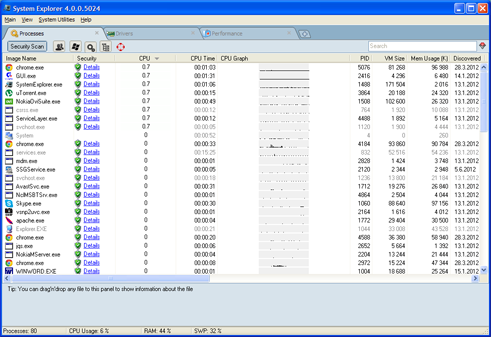Features - ProcessesProcesses moduleThis module shows the real core of every system - all running processes (executables) with many supplementary information. User can easily find out how the process behaves, if the process is safe or treat.
On this module, from the standard basic functions, user is allowed to re-order the columns, enable/disable any column, sort ascending or descending on any column, search the total list (using the Search filter in the top-right corner) and use the advanced menu features. Columns which can be displayed are: Image Name : shows the name of the running file taken from operating file system Security : shows the result of security scan taken from the cloud security database CPU : shows the actual percentage the process is taking from global CPU resources CPU Time : shows the sum of CPU time the process has taken during its life CPU Graph : shows the CPU load for the process in a graphical way PID : shows the process ID VM Size : virtual memory size amount the process is taking from system (in kB) Mem Usage (K) : memory size amount the process is taking from system (in kB) Discovered : date the file was created/discovered in the operating system User Name : shows the name of user under which the process is running Session : number of the session the process is running in, where 0 is system session Virtualized : when running on 64b OS, the applications which run as 32b will be marked as virtualised (1) Integrity Level : taken from system Mandatory Integrity Control, which is one of the Low, Medium, High, System, N/A - the meaning is encapsulation of system processes, check more on http://en.wikipedia.org/wiki/Mandatory_Integrity_Control Handles : number of handles the individual process has opened I/O Reads : number of reads performed by the process since its start I/O Writes : number of writes performed by the process since its start I/O Others : number of another communications of the process in bytes (logical operations on the OS, e.g. signal calling) I/O Read Data : number of bytes read by the process since its start I/O Write Data : number of bytes writen by the process since its start I/O Other Data : number of another communications data of the process in bytes (logical operations on the OS, e.g. signal calling) GDI Objects : number of graphical objects invoked by the process User Objects : number of system objects invoked by the process user Page Faults : number of pages not found in the memory which had to be read from disc cache Threads : total number of the threads the process had opened Privileged Time : CPU time the process has spent on OS kernel User Time : CPU time the process has spent on OS outside the kernel Priority : system priority set for the process : use right mouse button to select the desired Start Time : the time the process has started on the OS Affinity : afinity of the process defines the CPU core on which the process can run Parameters : command line parameters for the process Image Path : real full OS drive directory path the process is started from Product : name of the product for the process application Company : name of the issuing company for the process application Description : description given for the process from issuing company Version : version description given for the process from issuing company
On the right mouse click on each process, You can:
Did not find answer ? Send us your question via Support Ticket.
We answer only to english, System Explorer related questions.
|
